AI, Death, and Mourning: An Ethical Analysis Using Ethical Theories
VerifiedAdded on 2023/05/30
|6
|1654
|284
Essay
AI Summary
This essay critically examines the ethical implications of griefbots, AI designed to assist individuals in mourning the loss of loved ones. It delves into the ethical issues surrounding the development and implementation of these AI systems, analyzing them through the frameworks of deontology, contract theory, utilitarianism, and virtue ethics. The essay explores the potential benefits and drawbacks of griefbots, considering their impact on individuals and society. It argues the potential misuse of the technology for monetary gains and the addiction of people to these machines. The essay recommends careful consideration of the ethical considerations and potential risks associated with AI griefbots. The essay concludes that while griefbots may offer some assistance, the potential for misuse and negative consequences necessitates careful consideration and ethical guidelines.
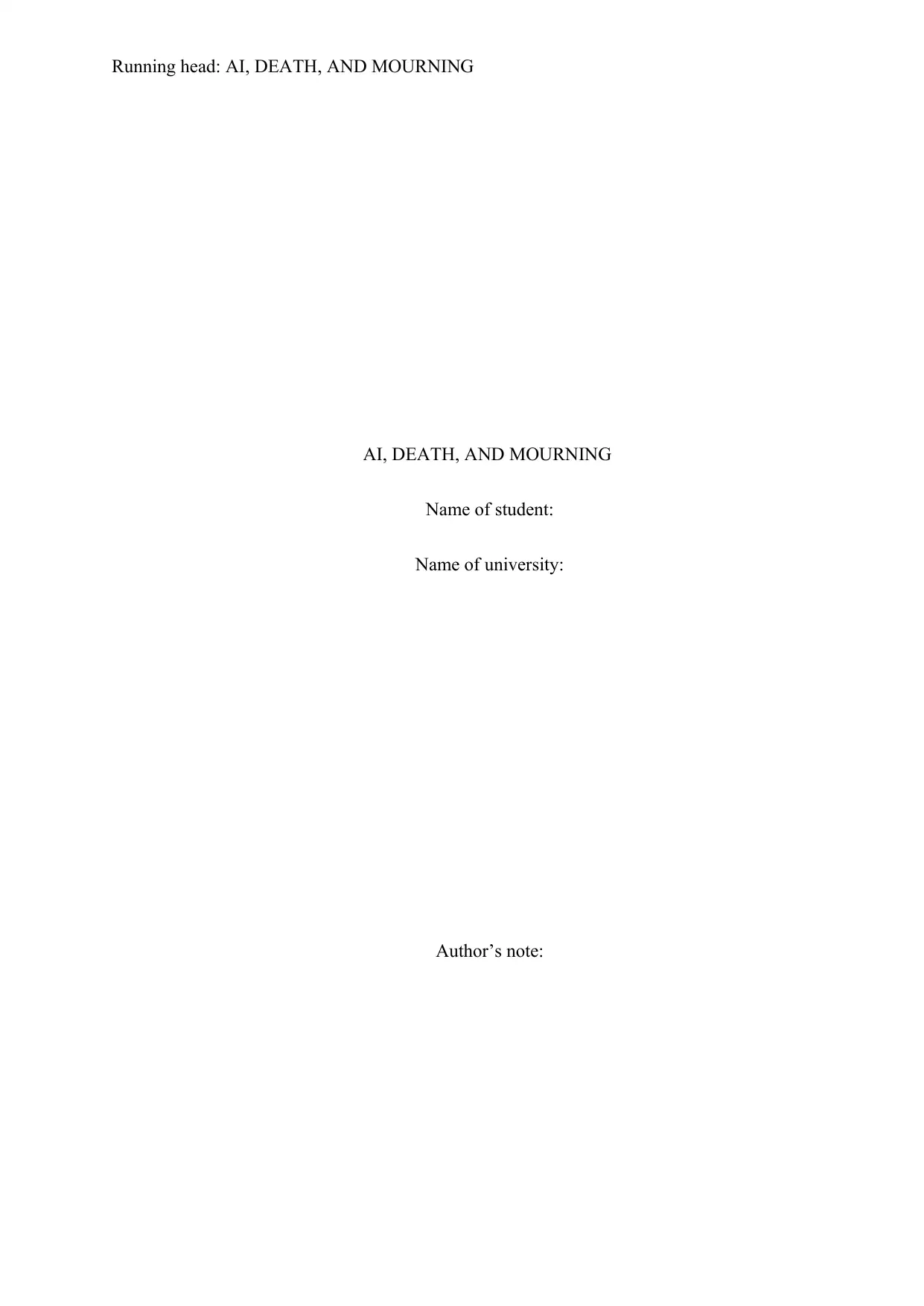
Running head: AI, DEATH, AND MOURNING
AI, DEATH, AND MOURNING
Name of student:
Name of university:
Author’s note:
AI, DEATH, AND MOURNING
Name of student:
Name of university:
Author’s note:
Paraphrase This Document
Need a fresh take? Get an instant paraphrase of this document with our AI Paraphraser
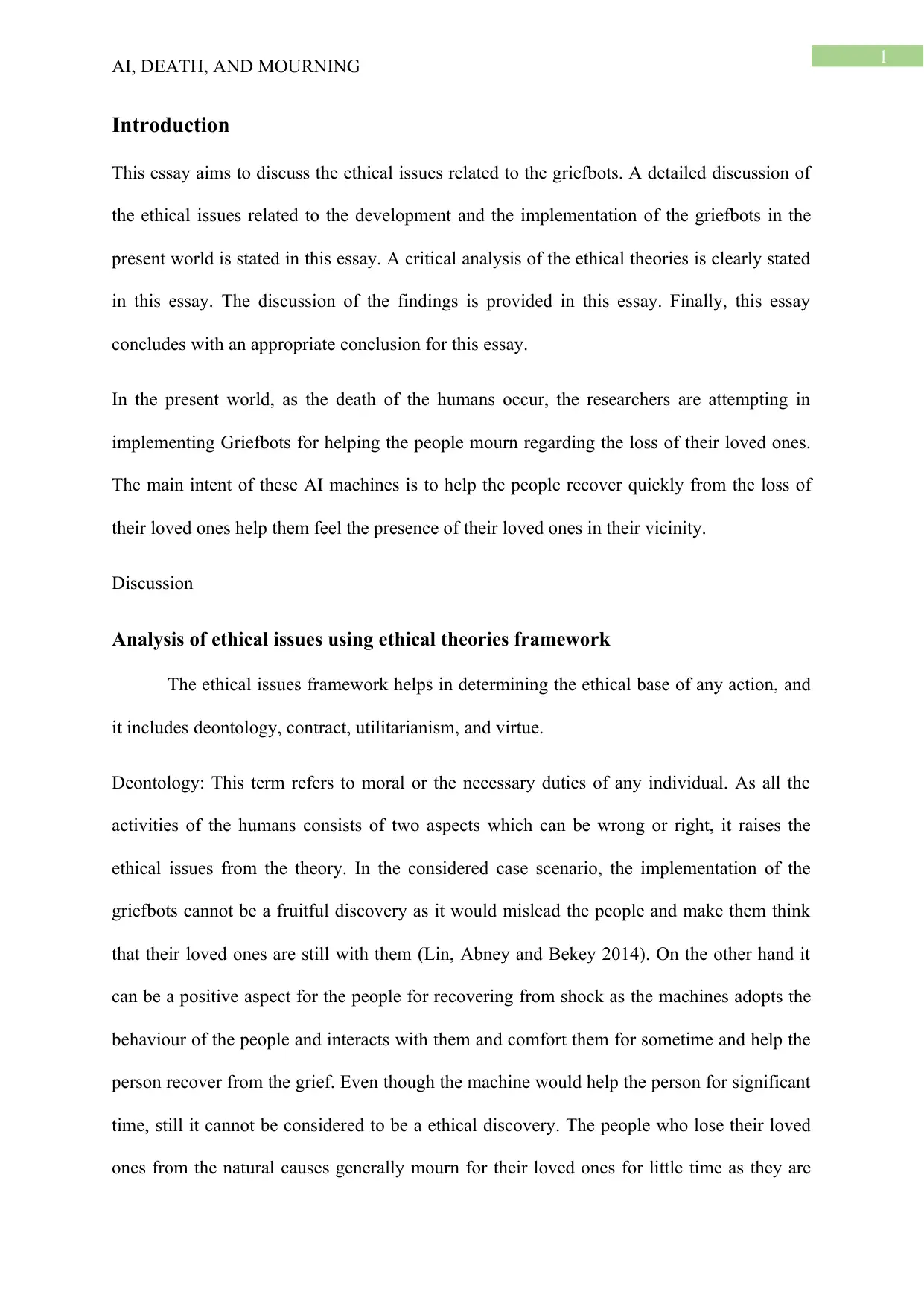
1
AI, DEATH, AND MOURNING
Introduction
This essay aims to discuss the ethical issues related to the griefbots. A detailed discussion of
the ethical issues related to the development and the implementation of the griefbots in the
present world is stated in this essay. A critical analysis of the ethical theories is clearly stated
in this essay. The discussion of the findings is provided in this essay. Finally, this essay
concludes with an appropriate conclusion for this essay.
In the present world, as the death of the humans occur, the researchers are attempting in
implementing Griefbots for helping the people mourn regarding the loss of their loved ones.
The main intent of these AI machines is to help the people recover quickly from the loss of
their loved ones help them feel the presence of their loved ones in their vicinity.
Discussion
Analysis of ethical issues using ethical theories framework
The ethical issues framework helps in determining the ethical base of any action, and
it includes deontology, contract, utilitarianism, and virtue.
Deontology: This term refers to moral or the necessary duties of any individual. As all the
activities of the humans consists of two aspects which can be wrong or right, it raises the
ethical issues from the theory. In the considered case scenario, the implementation of the
griefbots cannot be a fruitful discovery as it would mislead the people and make them think
that their loved ones are still with them (Lin, Abney and Bekey 2014). On the other hand it
can be a positive aspect for the people for recovering from shock as the machines adopts the
behaviour of the people and interacts with them and comfort them for sometime and help the
person recover from the grief. Even though the machine would help the person for significant
time, still it cannot be considered to be a ethical discovery. The people who lose their loved
ones from the natural causes generally mourn for their loved ones for little time as they are
AI, DEATH, AND MOURNING
Introduction
This essay aims to discuss the ethical issues related to the griefbots. A detailed discussion of
the ethical issues related to the development and the implementation of the griefbots in the
present world is stated in this essay. A critical analysis of the ethical theories is clearly stated
in this essay. The discussion of the findings is provided in this essay. Finally, this essay
concludes with an appropriate conclusion for this essay.
In the present world, as the death of the humans occur, the researchers are attempting in
implementing Griefbots for helping the people mourn regarding the loss of their loved ones.
The main intent of these AI machines is to help the people recover quickly from the loss of
their loved ones help them feel the presence of their loved ones in their vicinity.
Discussion
Analysis of ethical issues using ethical theories framework
The ethical issues framework helps in determining the ethical base of any action, and
it includes deontology, contract, utilitarianism, and virtue.
Deontology: This term refers to moral or the necessary duties of any individual. As all the
activities of the humans consists of two aspects which can be wrong or right, it raises the
ethical issues from the theory. In the considered case scenario, the implementation of the
griefbots cannot be a fruitful discovery as it would mislead the people and make them think
that their loved ones are still with them (Lin, Abney and Bekey 2014). On the other hand it
can be a positive aspect for the people for recovering from shock as the machines adopts the
behaviour of the people and interacts with them and comfort them for sometime and help the
person recover from the grief. Even though the machine would help the person for significant
time, still it cannot be considered to be a ethical discovery. The people who lose their loved
ones from the natural causes generally mourn for their loved ones for little time as they are
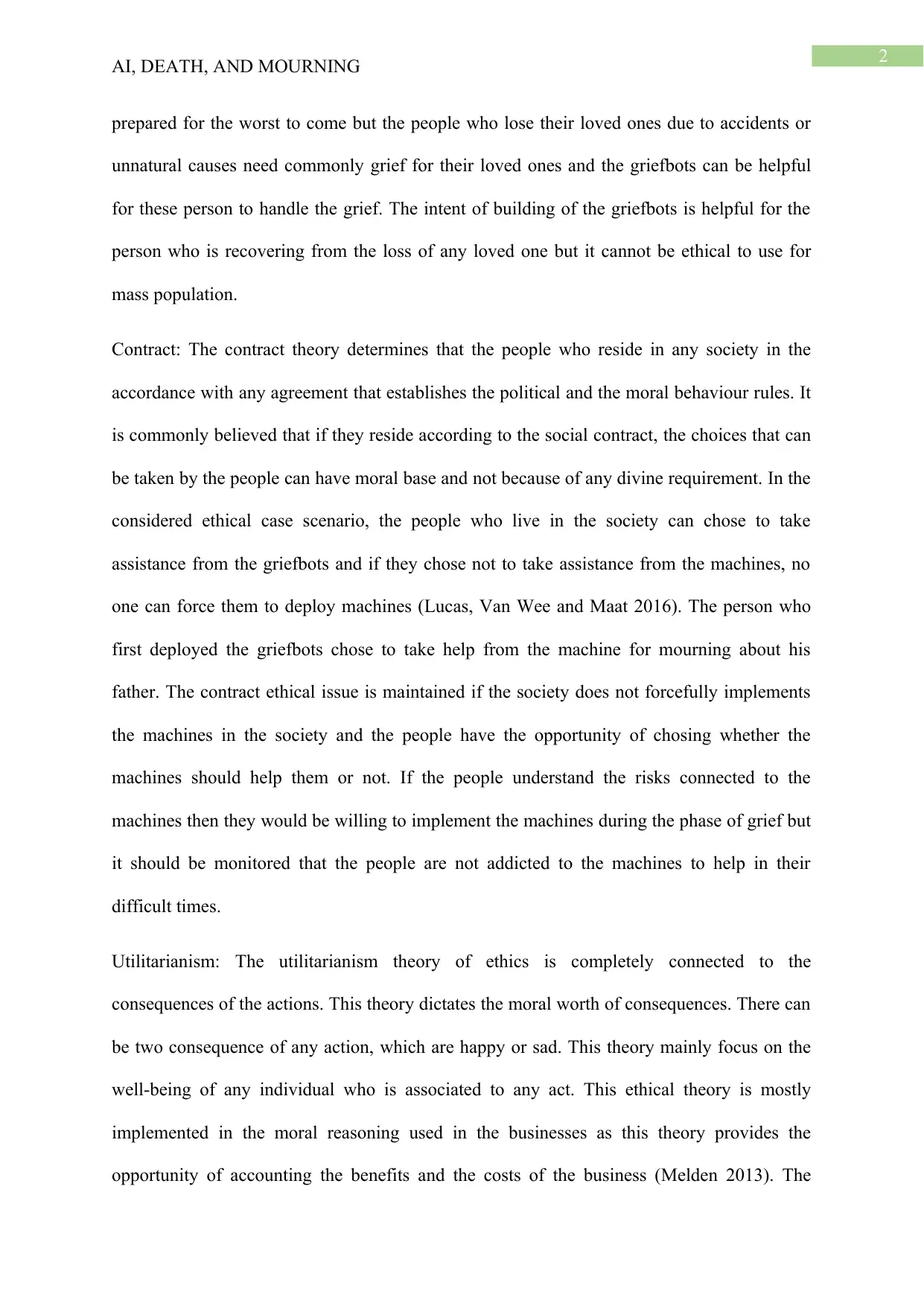
2
AI, DEATH, AND MOURNING
prepared for the worst to come but the people who lose their loved ones due to accidents or
unnatural causes need commonly grief for their loved ones and the griefbots can be helpful
for these person to handle the grief. The intent of building of the griefbots is helpful for the
person who is recovering from the loss of any loved one but it cannot be ethical to use for
mass population.
Contract: The contract theory determines that the people who reside in any society in the
accordance with any agreement that establishes the political and the moral behaviour rules. It
is commonly believed that if they reside according to the social contract, the choices that can
be taken by the people can have moral base and not because of any divine requirement. In the
considered ethical case scenario, the people who live in the society can chose to take
assistance from the griefbots and if they chose not to take assistance from the machines, no
one can force them to deploy machines (Lucas, Van Wee and Maat 2016). The person who
first deployed the griefbots chose to take help from the machine for mourning about his
father. The contract ethical issue is maintained if the society does not forcefully implements
the machines in the society and the people have the opportunity of chosing whether the
machines should help them or not. If the people understand the risks connected to the
machines then they would be willing to implement the machines during the phase of grief but
it should be monitored that the people are not addicted to the machines to help in their
difficult times.
Utilitarianism: The utilitarianism theory of ethics is completely connected to the
consequences of the actions. This theory dictates the moral worth of consequences. There can
be two consequence of any action, which are happy or sad. This theory mainly focus on the
well-being of any individual who is associated to any act. This ethical theory is mostly
implemented in the moral reasoning used in the businesses as this theory provides the
opportunity of accounting the benefits and the costs of the business (Melden 2013). The
AI, DEATH, AND MOURNING
prepared for the worst to come but the people who lose their loved ones due to accidents or
unnatural causes need commonly grief for their loved ones and the griefbots can be helpful
for these person to handle the grief. The intent of building of the griefbots is helpful for the
person who is recovering from the loss of any loved one but it cannot be ethical to use for
mass population.
Contract: The contract theory determines that the people who reside in any society in the
accordance with any agreement that establishes the political and the moral behaviour rules. It
is commonly believed that if they reside according to the social contract, the choices that can
be taken by the people can have moral base and not because of any divine requirement. In the
considered ethical case scenario, the people who live in the society can chose to take
assistance from the griefbots and if they chose not to take assistance from the machines, no
one can force them to deploy machines (Lucas, Van Wee and Maat 2016). The person who
first deployed the griefbots chose to take help from the machine for mourning about his
father. The contract ethical issue is maintained if the society does not forcefully implements
the machines in the society and the people have the opportunity of chosing whether the
machines should help them or not. If the people understand the risks connected to the
machines then they would be willing to implement the machines during the phase of grief but
it should be monitored that the people are not addicted to the machines to help in their
difficult times.
Utilitarianism: The utilitarianism theory of ethics is completely connected to the
consequences of the actions. This theory dictates the moral worth of consequences. There can
be two consequence of any action, which are happy or sad. This theory mainly focus on the
well-being of any individual who is associated to any act. This ethical theory is mostly
implemented in the moral reasoning used in the businesses as this theory provides the
opportunity of accounting the benefits and the costs of the business (Melden 2013). The
⊘ This is a preview!⊘
Do you want full access?
Subscribe today to unlock all pages.

Trusted by 1+ million students worldwide
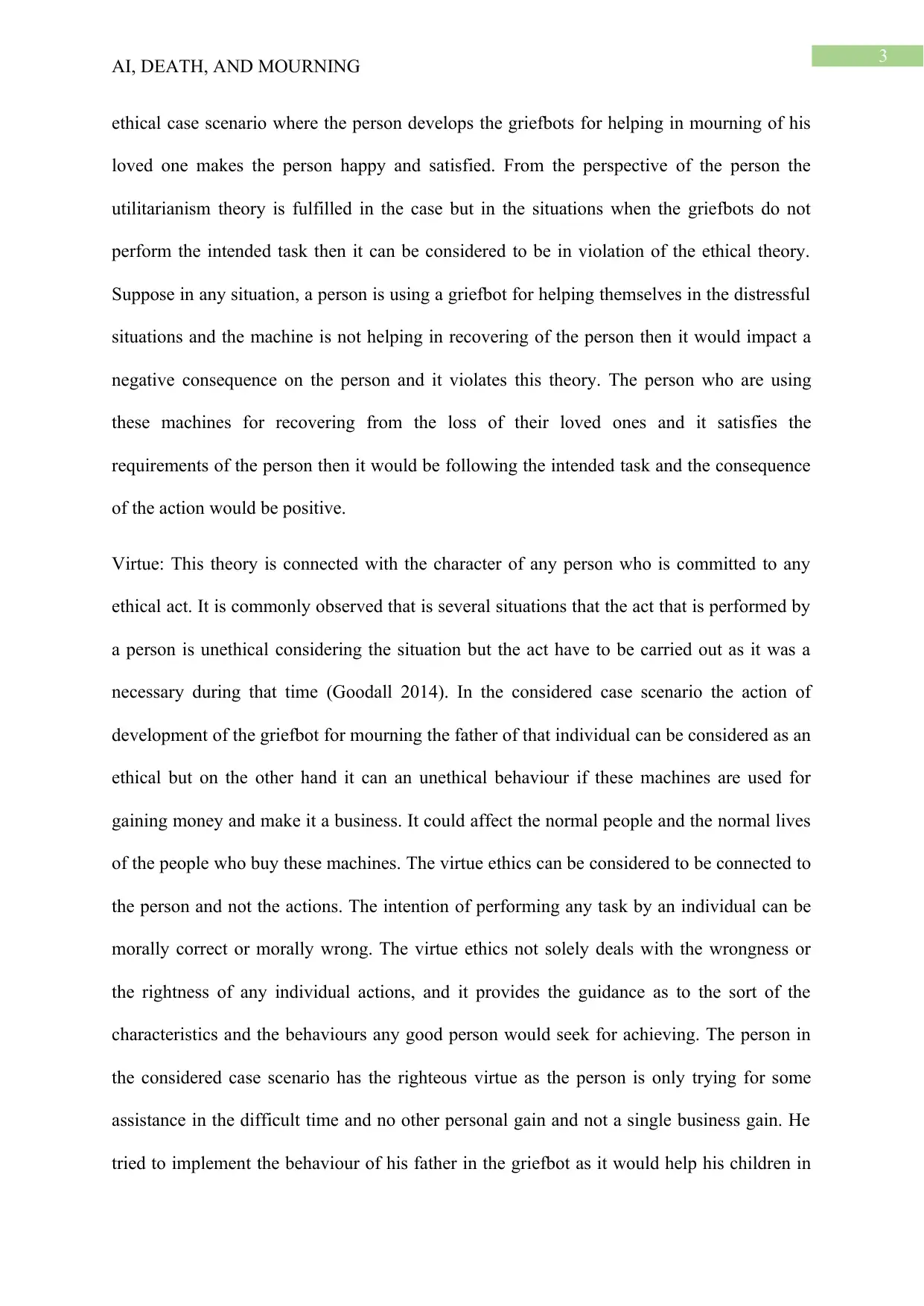
3
AI, DEATH, AND MOURNING
ethical case scenario where the person develops the griefbots for helping in mourning of his
loved one makes the person happy and satisfied. From the perspective of the person the
utilitarianism theory is fulfilled in the case but in the situations when the griefbots do not
perform the intended task then it can be considered to be in violation of the ethical theory.
Suppose in any situation, a person is using a griefbot for helping themselves in the distressful
situations and the machine is not helping in recovering of the person then it would impact a
negative consequence on the person and it violates this theory. The person who are using
these machines for recovering from the loss of their loved ones and it satisfies the
requirements of the person then it would be following the intended task and the consequence
of the action would be positive.
Virtue: This theory is connected with the character of any person who is committed to any
ethical act. It is commonly observed that is several situations that the act that is performed by
a person is unethical considering the situation but the act have to be carried out as it was a
necessary during that time (Goodall 2014). In the considered case scenario the action of
development of the griefbot for mourning the father of that individual can be considered as an
ethical but on the other hand it can an unethical behaviour if these machines are used for
gaining money and make it a business. It could affect the normal people and the normal lives
of the people who buy these machines. The virtue ethics can be considered to be connected to
the person and not the actions. The intention of performing any task by an individual can be
morally correct or morally wrong. The virtue ethics not solely deals with the wrongness or
the rightness of any individual actions, and it provides the guidance as to the sort of the
characteristics and the behaviours any good person would seek for achieving. The person in
the considered case scenario has the righteous virtue as the person is only trying for some
assistance in the difficult time and no other personal gain and not a single business gain. He
tried to implement the behaviour of his father in the griefbot as it would help his children in
AI, DEATH, AND MOURNING
ethical case scenario where the person develops the griefbots for helping in mourning of his
loved one makes the person happy and satisfied. From the perspective of the person the
utilitarianism theory is fulfilled in the case but in the situations when the griefbots do not
perform the intended task then it can be considered to be in violation of the ethical theory.
Suppose in any situation, a person is using a griefbot for helping themselves in the distressful
situations and the machine is not helping in recovering of the person then it would impact a
negative consequence on the person and it violates this theory. The person who are using
these machines for recovering from the loss of their loved ones and it satisfies the
requirements of the person then it would be following the intended task and the consequence
of the action would be positive.
Virtue: This theory is connected with the character of any person who is committed to any
ethical act. It is commonly observed that is several situations that the act that is performed by
a person is unethical considering the situation but the act have to be carried out as it was a
necessary during that time (Goodall 2014). In the considered case scenario the action of
development of the griefbot for mourning the father of that individual can be considered as an
ethical but on the other hand it can an unethical behaviour if these machines are used for
gaining money and make it a business. It could affect the normal people and the normal lives
of the people who buy these machines. The virtue ethics can be considered to be connected to
the person and not the actions. The intention of performing any task by an individual can be
morally correct or morally wrong. The virtue ethics not solely deals with the wrongness or
the rightness of any individual actions, and it provides the guidance as to the sort of the
characteristics and the behaviours any good person would seek for achieving. The person in
the considered case scenario has the righteous virtue as the person is only trying for some
assistance in the difficult time and no other personal gain and not a single business gain. He
tried to implement the behaviour of his father in the griefbot as it would help his children in
Paraphrase This Document
Need a fresh take? Get an instant paraphrase of this document with our AI Paraphraser
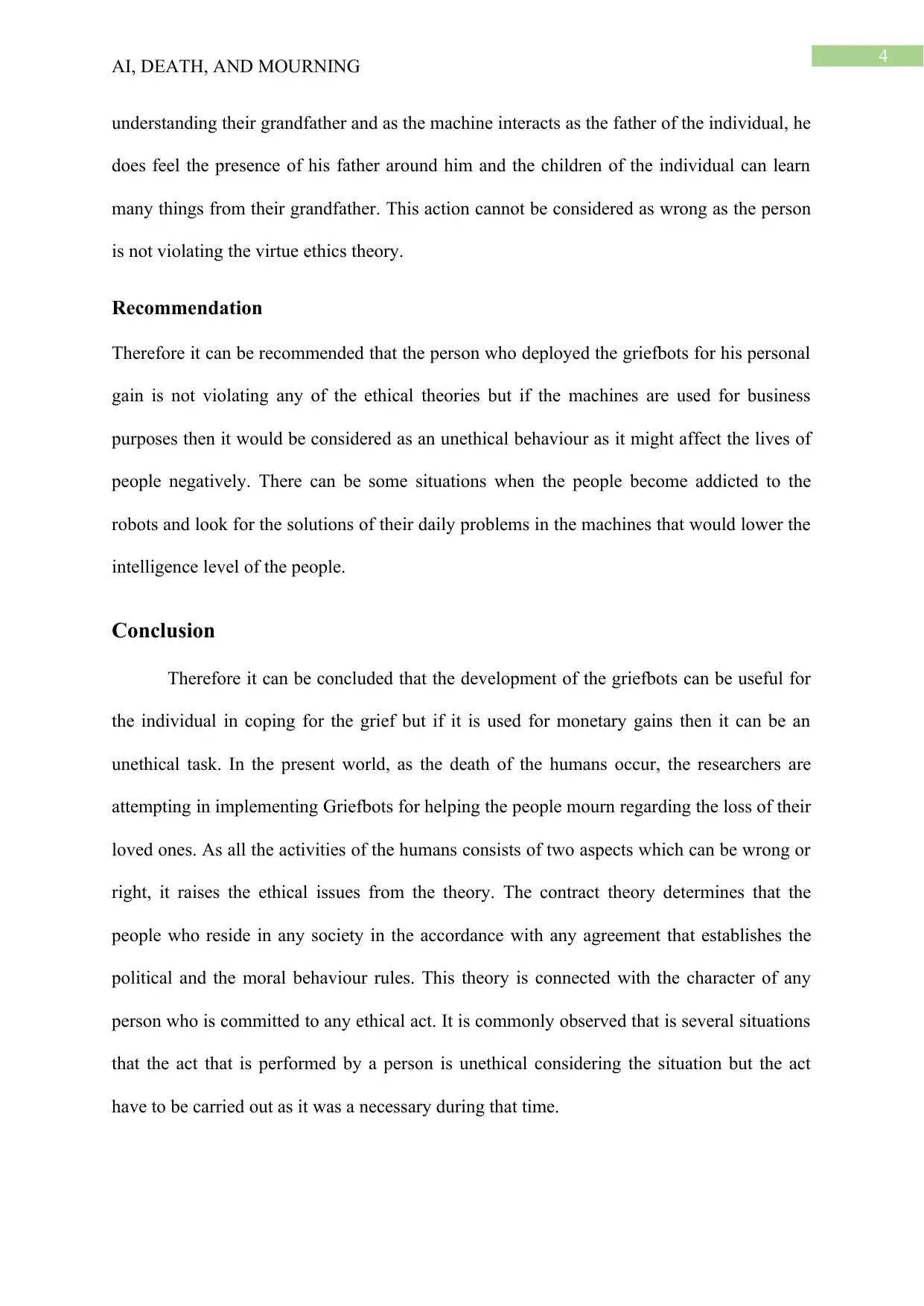
4
AI, DEATH, AND MOURNING
understanding their grandfather and as the machine interacts as the father of the individual, he
does feel the presence of his father around him and the children of the individual can learn
many things from their grandfather. This action cannot be considered as wrong as the person
is not violating the virtue ethics theory.
Recommendation
Therefore it can be recommended that the person who deployed the griefbots for his personal
gain is not violating any of the ethical theories but if the machines are used for business
purposes then it would be considered as an unethical behaviour as it might affect the lives of
people negatively. There can be some situations when the people become addicted to the
robots and look for the solutions of their daily problems in the machines that would lower the
intelligence level of the people.
Conclusion
Therefore it can be concluded that the development of the griefbots can be useful for
the individual in coping for the grief but if it is used for monetary gains then it can be an
unethical task. In the present world, as the death of the humans occur, the researchers are
attempting in implementing Griefbots for helping the people mourn regarding the loss of their
loved ones. As all the activities of the humans consists of two aspects which can be wrong or
right, it raises the ethical issues from the theory. The contract theory determines that the
people who reside in any society in the accordance with any agreement that establishes the
political and the moral behaviour rules. This theory is connected with the character of any
person who is committed to any ethical act. It is commonly observed that is several situations
that the act that is performed by a person is unethical considering the situation but the act
have to be carried out as it was a necessary during that time.
AI, DEATH, AND MOURNING
understanding their grandfather and as the machine interacts as the father of the individual, he
does feel the presence of his father around him and the children of the individual can learn
many things from their grandfather. This action cannot be considered as wrong as the person
is not violating the virtue ethics theory.
Recommendation
Therefore it can be recommended that the person who deployed the griefbots for his personal
gain is not violating any of the ethical theories but if the machines are used for business
purposes then it would be considered as an unethical behaviour as it might affect the lives of
people negatively. There can be some situations when the people become addicted to the
robots and look for the solutions of their daily problems in the machines that would lower the
intelligence level of the people.
Conclusion
Therefore it can be concluded that the development of the griefbots can be useful for
the individual in coping for the grief but if it is used for monetary gains then it can be an
unethical task. In the present world, as the death of the humans occur, the researchers are
attempting in implementing Griefbots for helping the people mourn regarding the loss of their
loved ones. As all the activities of the humans consists of two aspects which can be wrong or
right, it raises the ethical issues from the theory. The contract theory determines that the
people who reside in any society in the accordance with any agreement that establishes the
political and the moral behaviour rules. This theory is connected with the character of any
person who is committed to any ethical act. It is commonly observed that is several situations
that the act that is performed by a person is unethical considering the situation but the act
have to be carried out as it was a necessary during that time.
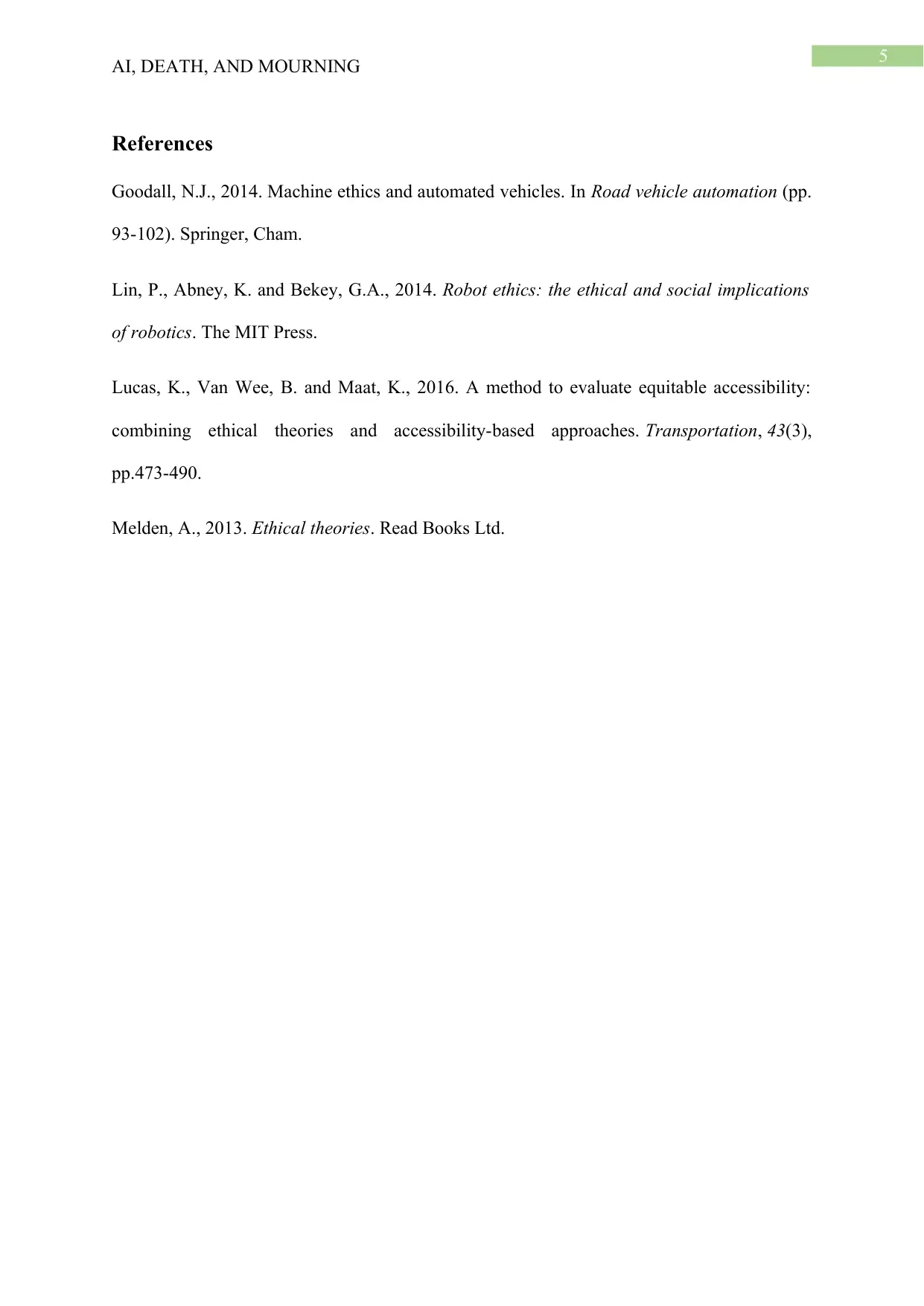
5
AI, DEATH, AND MOURNING
References
Goodall, N.J., 2014. Machine ethics and automated vehicles. In Road vehicle automation (pp.
93-102). Springer, Cham.
Lin, P., Abney, K. and Bekey, G.A., 2014. Robot ethics: the ethical and social implications
of robotics. The MIT Press.
Lucas, K., Van Wee, B. and Maat, K., 2016. A method to evaluate equitable accessibility:
combining ethical theories and accessibility-based approaches. Transportation, 43(3),
pp.473-490.
Melden, A., 2013. Ethical theories. Read Books Ltd.
AI, DEATH, AND MOURNING
References
Goodall, N.J., 2014. Machine ethics and automated vehicles. In Road vehicle automation (pp.
93-102). Springer, Cham.
Lin, P., Abney, K. and Bekey, G.A., 2014. Robot ethics: the ethical and social implications
of robotics. The MIT Press.
Lucas, K., Van Wee, B. and Maat, K., 2016. A method to evaluate equitable accessibility:
combining ethical theories and accessibility-based approaches. Transportation, 43(3),
pp.473-490.
Melden, A., 2013. Ethical theories. Read Books Ltd.
⊘ This is a preview!⊘
Do you want full access?
Subscribe today to unlock all pages.

Trusted by 1+ million students worldwide
1 out of 6
Related Documents
Your All-in-One AI-Powered Toolkit for Academic Success.
+13062052269
info@desklib.com
Available 24*7 on WhatsApp / Email
![[object Object]](/_next/static/media/star-bottom.7253800d.svg)
Unlock your academic potential
Copyright © 2020–2026 A2Z Services. All Rights Reserved. Developed and managed by ZUCOL.




